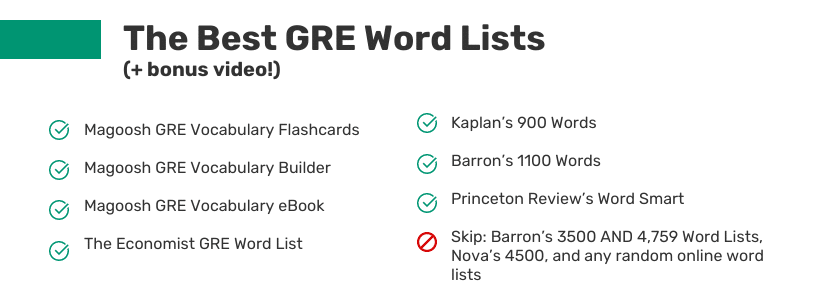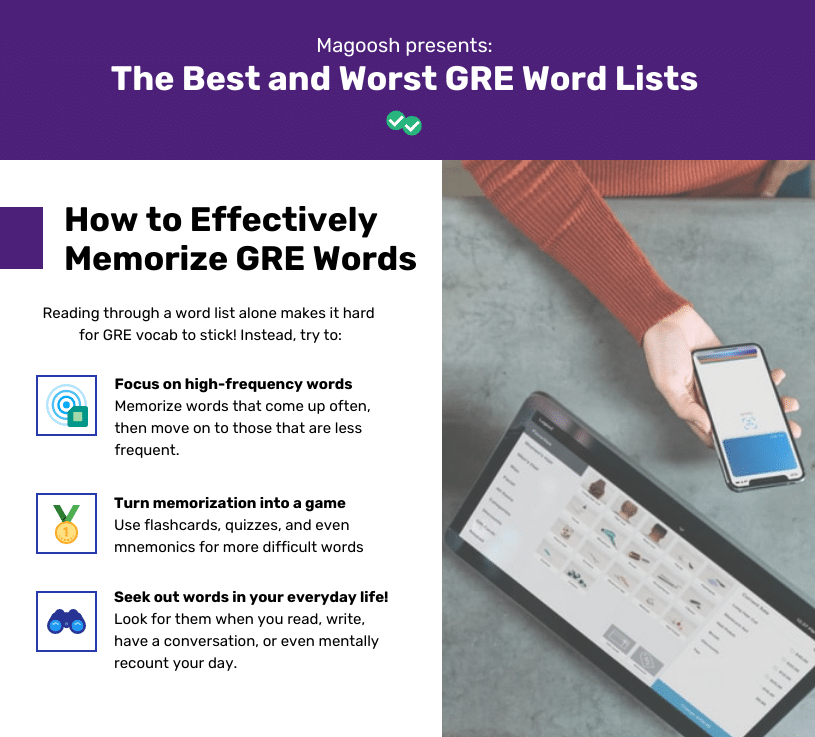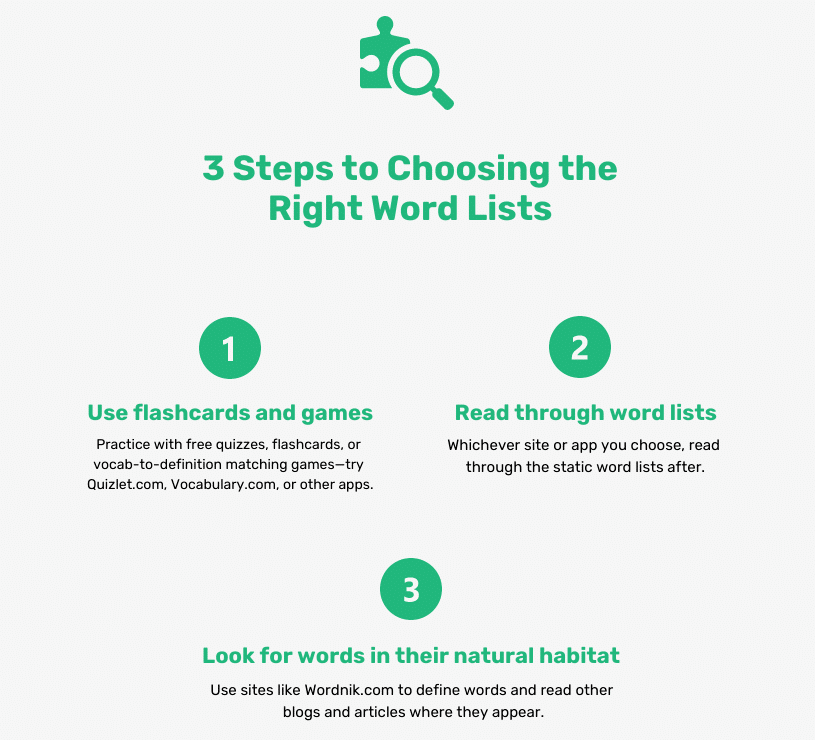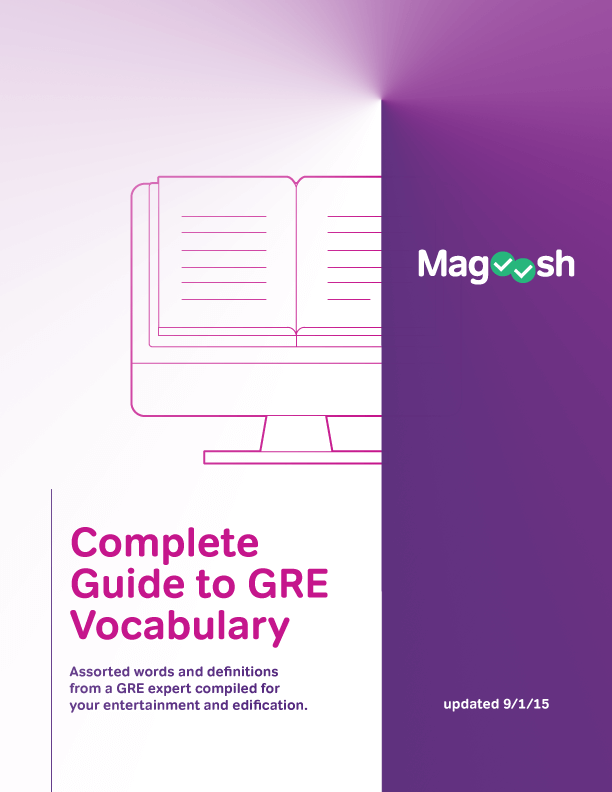Even though the number of verbal questions dropped from 40 to 27 with the launch of the shorter GRE in 2023, the fact remains: The Verbal section LOVES testing obscure vocabulary.
Thus, vocabulary memorization will be an essential part of most test-taker’s GRE preparation. But, where does one even begin!?!?
Fortunately, there are hundreds of GRE word lists floating around the Internet. Unfortunately, most of these lists are…wanting (a GRE word that means lacking).
To help you focus your search on quality versus quantity, the mission of this post is to guide you to the best of what’s available and to help you get cracking on your GRE vocabulary journey. First, here’s a quick overview of the way vocabulary is tested on the GRE.
When and How Vocab is Tested on the GRE
GRE words are tested—surprise!—only in the GRE Verbal Reasoning sections. There are three types of questions in the Verbal section, all multiple choice:
- Reading Comprehension, in which you read a passage and answer a series of questions about it
- Sentence Equivalence, in which you read a sentence with a blank and select two answer choices that will give the sentence the same meaning.
- Text Completions, in which you read a sentence with one, two, or even three blanks and provide the choice or choices that best fit the context.
Yes, you will even encounter vocabulary-based questions on Reading Comprehension passages, but they are more about using context clues to determine “less-common meanings of commonly used vocabulary words” than directly testing your knowledge of definitions.
The other two types, Sentence Equivalence and Text Completion, are where your knowledge of GRE words will have the biggest payoff. The importance of having a solid GRE vocabulary to attack these questions cannot be overstated.
Table of Contents
GRE Word Lists: The Best and the Worst in 2024
Although knowing the most heavily tested GRE words will certainly give you a leg up on test day, to achieve a top-notch score you’ll need to make sure you have hundreds of GRE words in your arsenal. To that aim, here are the lists to use and the one, in particular, to avoid.

More of The Best GRE Word Lists
Magoosh GRE Vocabulary Flashcards
Magoosh’s Vocabulary Flashcards help you learn the definitions of over 1,000 high-frequency words. There are 20 decks of about 50 words each, sorted into categories of common, basic, or advanced. As you come across a word, think of the definition before looking at it; once you verify whether or not you know the meaning of the word, you can mark the card accordingly and the app will keep track of your progress.
Magoosh GRE Vocab Builder
A great complement to our flashcards, Magoosh’s Vocabulary Builder uses multiple-choice questions to test your knowledge of word meanings, providing another way to master over 1,000 words. Like our flashcards, our Vocabulary Builder organizes words by level of difficulty and tracks the words you need to review the most. This allows you to truly customize your GRE vocab memorization, saving you valuable time and making sure you truly remember what you have studied.
Magoosh GRE Vocabulary PDF
Magoosh’s GRE Vocabulary PDF is probably one of the most interesting GRE word lists you will come across. Filled with 300+ of the most common GRE words, this PDF is essentially a collection of mini-lists organized around certain themes (e.g. most common words that students get wrong, words to do with money), which can help you memorize new vocab faster. Plus, all of these words are tested in our vocab apps. Click the button below to download it!
Other Great GRE Word Lists
If you’ve already been studying with the lists mentioned below, then you’re in good hands. All these GRE word lists contain high-frequency GRE words:
- Kaplan’s 900 Words
- Barron’s 1100 Words
- Princeton Review’s Word Smart
- Magoosh GRE Word Lists: Root Words & Prefixes, Words with Multiple Meanings, and Commonly Confused Words.
The Worst GRE Word Lists
Barron’s 3500 AND 4,759 Word Lists
If you happen to come across these old lists by Barron, toss them aside. Hundreds of words are crammed on one page, definitions are vague, and words are not adequately shown in context. If you slog through them, you won’t know the difference between high-frequency and low-frequency words.
Nova’s 4500
This list is in Nova’s verbal book. Like anything Nova releases for verbal, avoid it. This list really is a travesty to GRE word lists. Words are vaguely—and often mistakenly—defined. Words you’ll never see are lumped together with high-frequency words. There is no better way to waste one’s precious GRE prep time than studying this list.
Random Internet Word Lists
These are a dime a dozen and often they poach Barron’s word lists. Others are just random word lists filled with archaic words or “analogy words” that appeared on the old GRE. Avoid these lists at all costs.
How to Approach GRE Word Lists
How To Memorize GRE Word Lists

The key to memorizing new vocabulary—well, anything really—is to take an active, rather than passive, approach. Do not simply read through a GRE word list of unknown words.
Why? Well, our brains learn from being challenged. When you’re just reading each word and then the definition, you’re not actually challenging your brain.
For example, if you quiz someone 30 minutes after they’ve read a vocab list, they might remember the placement of words (“Oh yes, ‘stymie’ was next to ‘esoter…i…’ something, uh…”). But remembering the definition is much more of a struggle.
So here are a few tips to help you most effectively memorize new GRE words:
- Focus on high-frequency words. As you do your GRE practice, make sure to note which words come up more frequently and which come up less frequently; focus on fully memorizing high-frequency words first before conquering low-frequency words.
- Make a game out of GRE vocab memorization. Take advantage of flashcards and quizzes (much more on this below) and come up with mnemonics to remember more difficult words.
- Seek out the words in your everyday life! Look for them when you’re reading (and make sure you’re reading a lot!). Mentally describe experiences you have or concepts you encounter with your newly learned words. Or find ways to use them in your day-to-day writing or conversations—if you’ve figured out how to do this without seeming pompous 😉
Making the Most of GRE Word Lists
To make the most of these GRE word lists, you have to make them fun and dynamic. Luckily for you, the internet is replete with free websites and apps that offer hundreds of vocab lists in the form of quizzes, flashcards, vocab-to-definition matching games, and more. In fact, every one of the following word lists has been gamified on Quizlet.com, Vocabulary.com, and/or come in their own app form.

Given these resources, here are some good rules to follow:
- Practice mastering the words through GRE flashcards and games first.
- Read through the static GRE word lists in order to reinforce the words that you’re practicing and to also fill in information that may not be available in their game form (e.g. seeing how a word is used in an example sentence).
- Finally, look for these words in their natural habitat in order to truly understand how they’re used organically. A great resource to help you do so is wordnik.com. Wordnik will not only define any word for you, but it will also link to blogs and articles where the word appears.
Help! I’m Still Struggling With Learning Vocabulary
For more vocab tips and resources, check out our post on How to Study GRE Vocabulary!
Top 20 Most Tested GRE Words
Now that we’ve covered some memorization basics, here’s an opportunity to learn the top 20 most tested words on the GRE. Check out the list below and try to memorize all the definitions! Then, test yourself to see if you can get it right.
- Ambivalent (adj.)
- Auspicious (adj.)
- Belligerent (adj.)
- Capricious (adj.)
- Corroborate (v.)
- Enervate (v.)
- Ephemeral (adj).
- Erudite (adj.)
- Esoteric (adj)
- Extant (adj.)
- Fastidious (adj.)
- Inculpate (v.)
- Loquacious (adj.)
- Magnanimous (adj.)
- Mercurial (adj.)
- Pragmatic (adj.)
- Prolific (adj.)
- Reticent (adj.)
- Sanguine (adj.)
- Soporific (adj.)
Click here for the definition
Having contradictory feelings.
Erin was ambivalent about her freshman year in college; her classes were fascinating but she missed her high school friends.
Click here for the definition
Favorable.
The team’s run for the pennant started auspiciously with 24 wins. Two starting pitchers snapped their elbows mid-season, clearly an inauspicious sign.
Click here for the definition
Inclined to fight.
After a few drinks Stevie was convivial; after two six-packs he became belligerent, challenging anyone around him to a head-butting contest.
Click here for the definition
Unpredictable, whimsical.
Because Mario was so capricious his friends felt they could not rely on him.
Test yourself: Click here to try a question using capricious.
Click here for the definition
To confirm, make stronger.
Three witnesses were able to corroborate Lucy’s alibi that she had been at the bowling alley at the time of the murder.
Click here for the definition
To weaken; drain the energy from.
Sitting in the windowless room, the tropical humidity soaking through the walls, I was enervated before noon.
Click here for the definition
Short-lived.
Youtube has made fame truly ephemeral. Just ask Rebecca Black.
Test yourself: Click here to try a question using ephemeral from our GRE product.
Click here for the definition
Scholarly.
A Rhodes Scholar, Maxine was a true erudite, and a formidable opponent on Jeopardy.
Test yourself: Click here to try a practice question using erudite from our GRE product.
Click here for the definition
Known to a select few.
Many jazz artists once deemed esoteric have emerged due to the greater access users have to avant-garde music on-line.
Test yourself: Click here to try a practice question using esoteric.
Click here for the definition
In existence (most commonly referring to texts).
Few documents antedating the advent of papyrus are extant today.
Click here for the definition
Nitpicky.
A fastidious eater, Herman would only eat the center of anything he touched. As a result, his plate was strewn with the remnants of his dinner, an eyesore for the hapless dinner guest.
Click here for the definition
To charge with wrong-doing; accuse.
To inculpate Eddy with the murder was absurd; he’d been bowling with Lucy.
Click here for the definition
Talkative.
Carl was so loquacious his friends usually didn’t like to watch a movie with him.
Click here for the definition
Big-hearted; generous.
Upon receiving his first Wall Street paycheck, Jerry was so magnanimous he not only bought his Mom a car, he bought his Dad one too.
Click here for the definition
1. Changing one’s personality often and unpredictably.
2. Animated, sprightly.
One never knew exactly what the professor’s class would be like; he was so mercurial that many of his students thought of him as two different people.
Click here for the definition
Practical.
Edna never cared for abstract thinking and preferred the pragmatic world of business, in which every action, ideally, has an intended consequence.
Test yourself: Click here to try a practice question using pragmatic.
Click here for the definition
Producing or creating abundantly.
Irving Berlin had one of the most prolific careers in song-writing history; dozens of his hundreds of tunes are familiar to us. Anyone dreaming of a “White Christmas?”
Click here for the definition
Tightlipped, not prone to saying much, reluctant.
Paul was reticent and preferred observing others mannerisms.
Click here for the definition
Cheerful; optimistic.
A Yale graduate with a 4.0, she was sanguine about finding a job right out of college.
Click here for the definition
Inducing sleep.
Professor Moore’s lectures were soporific to the point that students, before they nodded off in class, would usually quip, “It’s time for Professor Bore.”
Conclusion
With the resources provided in this post, you’re well on your way to becoming a GRE vocabulary master! Just remember to make your memorization a dynamic and fun exercise. Before you know it, you’ll not only be in great shape for the GRE, but you’ll also have a whole new vocabulary with which you can improve your writing and general communications!
To put your vocab skills to the test, here is a full-length, free practice test from Magoosh that includes a detailed score report with a topic-by-topic breakdown of your performance. You can choose to do just the Verbal section or a full length exam. Happy studying!







Leave a Reply